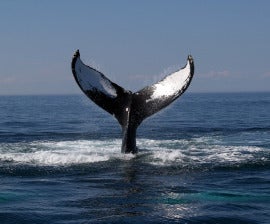-

Still recovering from decades of whaling. Edzard de Ranitz/iStockphoto
The Pelly Amendment to the Fisherman’s Protective Act allows the U.S. Secretary of Commerce or the Secretary of the Interior to determine and certify to the President when foreign nationals are conducting activities that diminish the effectiveness of an international fisheries conservation program or engaging in trade or taking that diminishes the effectiveness of an international program for endangered or threatened species.
Should the Secretaries choose to certify a country under the Pelly Amendment, the U.S. President has 60 days to decide whether to impose trade sanctions on the offender.
Sending a signal
Despite continued defiance of the international ban on commercial whaling by a small group of countries, the United States has never issued trade sanctions, even though whaling nations have been certified under Pelly multiple times for undermining the International Whaling Commission.
HSI and The HSUS have also called on the U.S. to certify Iceland for its international trade in whale meat and other products that undermine trade bans imposed by CITES. On February 6, 2014, The Department of the Interior did so, in a long-awaited demonstration of the United States’ firm opposition to trade in whale products. We hope that the government will take the next step by imposing trade sanctions against Iceland.
Iceland: A timeline
In 1986, the moratorium on commercial whaling imposed by the IWC went into effect. Although Iceland did not formally object to this moratorium, it chose to leave the IWC in 1992.
In 2002, it rejoined the IWC with a reservation to the moratorium. At this time, Iceland began taking whales under special permit for scientific research and in 2004 the Secretary of Commerce at the time certified the country under Pelly, but opted not to pursue trade sanctions in the hope that the threat alone would influence Iceland’s behavior.
Instead, in 2006 Iceland decided to resume commercial whaling under its reservation to the IWC moratorium. Rather than taking action under the Pelly Amendment, the U.S. decided to try for a diplomatic solution.
Unfortunately, these efforts failed and Iceland continues to undermine both the IWC and CITES, which prohibits the commercial trade in whale products. In fact, it has drastically increased its self-allotted quotas and annually exports tons of whale meat, blubber and oil.
Time for action
Decades of rampant commercial whaling and international trade by a small group of countries has depleted great whale populations. Iceland must stop thumbing its nose at two international agreements trying to protect the great whales from unnecessary slaughter and greed.
